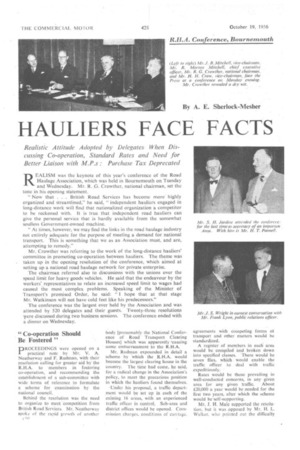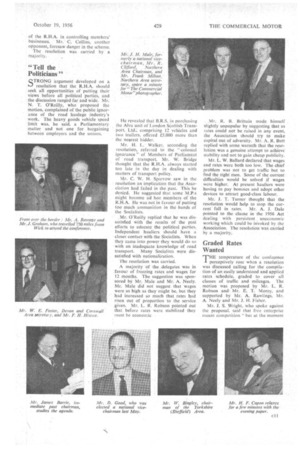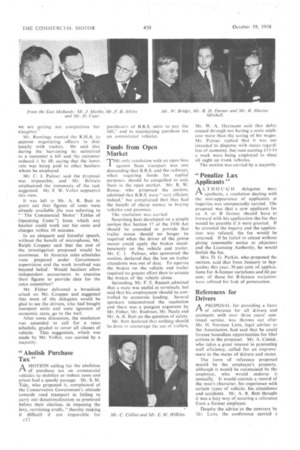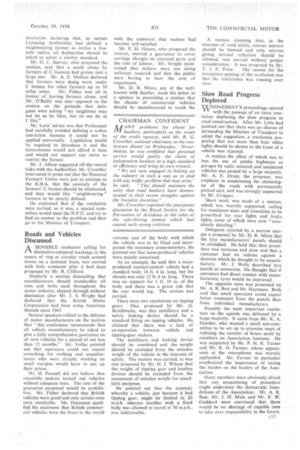HAULIERS FACE FACTS
Page 48

Page 49

Page 50

Page 51

If you've noticed an error in this article please click here to report it so we can fix it.
Realistic Attitude Adopted by DelegatesWhen Discussing Co-operation, Standard Rates and Need for Better Liaison with M.P.s : Purchase Tax Deprecated
By A. E. Sherlock-Mesher
REALISM was the keynote of this year's conference of the Road Haulage Association, which was held in Bournemouth on Tuesday and Wednesday. Mr. R. .G. Crowther, national chairman, set the tone in his opening statement.
"Now that . . ., British Road Services has become more highly organized and streamlined," he said, "independent hauliers engaged in long-distance work will find that nationalized organization a competitor to be reckoned with. It is true that independent road hauliers can give the personal service that is hardly available from the somewhat soulless Government-owned machine.
"At times, however, we may find the links in the road haulage industry not entirely adequate for the purpose of meeting a demand for national transport. This is something that we as an Association must, and are, attempting to remedy."
Mr. Crowther was referring to the work of the long-distance hauliers' committee in promoting co-operation between hauliers. The theme was taken up in the opening resolution of the conference, which aimed at setting up a national road haulage network for private enterprise.
The chairman referred also to discussions with the unions over the speed limit for heavy goods vehicles. He said that the endeavour by the workers'. representatives to relate an increased speed limit to wages had caused the most complex problems. Speaking of the Minister of Transport's promised Order, he said: "1 hope that at that stage Mr. Watkinson will not have cold feet like his predecessors."
The conference was the largest ever held by the Association and was attended by 520 delegates and their guests. Twenty-three resolutions yvere discussed during two business sessions. The conference ended with a dinner on Wednesday.
"Co-operation Should Be Fostered"
PROCEEDINGS were opened on a practical note by Mr. V. A. Neatherway and F. Rudman, with their resolution calling for greater aid by the R.H.A. to members in fostering co-operation, and recommending the establishment of a sub-committee with wide terms of reference to formulate a scheme for examination by the national council.
Behind the resolution was the need to organize to meet 'competition from British Road Services. Mr. Neathervvay spoke of the rapid growth of another body [presumably the National Conference of Road• Transport Clearing Houses] which was apparently 'causing some embarrassment to the R.H.A.
Mr. Rudman expounded in detail a scheme by which the R.H.A. would become the largest clearing house in the country. The time had come, he said, for a radical change in the Association's policy, to meet the precarious position in which the hauliers found themselves. -Under his proposal, a traffic department would he set up in each of the existing 16 areas, with an experienced traffic officer in control. Sub-area and district offices would be opened. Commission charges, conditions of carriage.
agreements with competing forms of transport and: other matters would he standardized.
A register of members in each area would be compiled and broken down into specified classes. There would be seven files, which would enable the traffic officer to deal with traffic expeditiously.
Rates would be those prevailing in well-conducted concerns, in any given area for any given traffic. About £20,000 a year would be needed for the first two years, after which the scheme would be'self-supporting.
Mr. J. H. Male supported the resolution, hut it was opposed by Mr, W. L. Walker, who pointed out the difficulty
of the R.H.A. in controlling members' businesses. Mr. C. Collins, another opponent, foresaw danger in the scheme_ The resolution was carried by a majority.
"Tell the Politicians"
STRONG argument developed on a resolution that the R.H.A. should seek all opportunities of putting their views before all political parties, and the discussion ranged far and wide. Mr. N. T. O'Reilly, who proposed the motion, complained of the public ignorance of the road haulage industry's work. The heavy goods vehicle speed limit was, he said, a Parliamentary matter and not one for bargaining between employers and the unions.
He revealed that B.R.S. in purchaSing the Alva unit of London Scottish Transport, Ltd.; comprising 12 vehicles and two trailers, offered J:5,000 more than the nearest bidder.
Mr. H. L. Walker, seconding the resolution, referred to the " colossal ignorance" of Members of Parliament of road transport. Mr. W. Bridge thought that the R.H.A. always started too late in the day in dealing with matters of transport policy.
Mr. C. W. H. Sparrow saw in the resolution an implication that the Association had failed in the past. This he denied. He suggested that some M.F.s might become ad hoc members of the R.H.A. He was not in favour of putting too much ammunition in the hands of the Socialists.
Mr. O'Reilly replied that he was dissatisfied with the results of the past efforts to educate the political parties. Independent hauliers should have a closer contact with the Socialists. When they came into power they would do so with an inadequate knowledge of road
transport. Many Socialists were dissatisfied with nationalization.
The resolution was carried.
A majority of the delegates was in favOur of freezing rates and wages for 12 months. The suggestion was sponsored by Mr. Male and Mr. A. Neely. Mr. Male did not suggest that wages were as high as they might be. but they had increased so much that rates had risen out of proportion to the service given. Mr, L. R. Robson pointed out that before rates were stabilized they must be economic Mr. R. B. lirittain made himself slightly unpopular by suggesting that as rates could not be raised in any event, the Association should try to make capital out of adversity. Mr. A. R. Butt replied with some warmth that the resolution was a genuine attempt to achieve stability and not to gain cheap publicity.
Mr. L. W. Ballard declared that wages and rates were both too low. The chief problem was not to get traffic but to find the right men_ Some of the current difficulties would be solved if wages were higher. At present hauliers were having to pay bonuses and adopt other devices to attract good-class labour.
Mr. J. T. Turner thought that the resolution would help to stop the cur rent fall in rates, Mr. A. J. Dale pointed to the clause in the 1956 Act dealing with persistent uneconomic working which could he invoked by the Association. The resolution was carried by a majority.
Graded Rates Wanted THE temperature of the conference perceptively rose when a resolution was discussed calling for the compilation of an easily understood and applied rates schedule, graded to cover all classes of traffic and mileages. The motion was proposed by Mr. L. R. Robson andMr. E. T. Morey, and supported by Mr. A. Rawlings, Mr. A. Neely and Mr. J. H. Fisher.
Mr. J. S. Wright, who spoke against the proposal, said that free enterprise meant competition " but at the moment
we are getting not competition but slaughter."
Mr. Rawlings wanted the R.H.A. to appoint negotiating officers to• deal locally 1.vith traders. He said that during the harvesting he submitted to a customer a bill and the customer reduced it by £8. saying that the lower rate was being paid to other hauliers whom he employed.
Mr. C. J. Palmer said the proposal was impossible, and Mr. Briitain emphasized the immensity of the task suggested. Mr. E. W. Voller supported this view.
It was left to Mr. A. R. Butt to point out that figures of costs were already available [he was referring to The Commercial Motor' Tables of Operating Costs "] from which any haulier could work out his costs and charges within 10 minutes.
In an eloquent and forceful speech, without the benefit of microphone, Mr. Ralph Cropper said that the cost of the investigation proposed would be enormous. In America rates schedules were prepared under Government supervision and the work involved was beyond belief. Would hauliers allow independent accountants to examine their figures to provide data for the rates committee?
Mr. Fisher delivered a broadside attack on Mr. Cropper and suggested that most of the delegates would be glad to see the drivers, who had bought transport units and were ignorant of economic rates, go to the wall.
After some discussion, the resolution was amended to call for a rates schedule, graded to cover all classes of vehicle. This suggestion, which was made by Mr. Voller, was carried by a majority.
"Abolish Purchase Tax"
.1-1 A MOTION calling for the abolition of purchase tax on commercial vehicles to stabilize or reduce costs and prices had a speedy passage. Mr. S. M. Tidy, who proposed it, complained of the Conservative Government's attitude towards road transport in failing to carry out denationalization as promised before their election, in imposing the levy, restricting credit. thereby making it difficult if not impossible for c12
purchasers of B.R.S, units to pay the bill," and in maintaining purchase tax on commercial vehicles.
Funds from Open Market
THE only resolution with an open bias against State transport was one demanding that B.R.S. and the railways, when requiring funds for capital purposes, should be compelled to seek them in the open market. Mr. R. W. Rouse, who proposed the motion, admitted that B.R.S. were " very efficient indeed." but complained that they had the benefit of cheap money in buying vehicles and premises.
The resolution was carried.
Surprising heat developed on a simple motion that Section 17 of the 1930 Act should be amended to provide that trailer mates should no longer be required when the driver of the prime mover could apply the brakes simultaneously on the vehicle and trailer. Mr. C. J. Palmer, who sponsored the motion, declared that the law on trailer attendants was out of date. To operate the brakes on the vehicle and trailer required no greater effort than to actuate the brakes of the vehicle alone.
Seconding, Mr. F. E. Russett admitted that a mate was useful at terminals. but said that his employment should be controlled by economic loading. Several speakers misconstrued the resolution and there was a pungent argument by Mr. Fisher, Mr. Rudman, Mr. Neely and Mr. A. R. Butt on the question of safety.
Mr. Butt declared that nothing should be done to encourage the use of trailers.
Mr. W. A. Heymann said that delay, caused through not having a mate might cost more than the saving of his wages. Mr. Palmer replied that it was not intended to dispense with mates regardless of economy. but men earning £13-14 a week were being employed to sleep all night on trunk vehicles.
The motion was carried by a majority.
Penalize Lax Applicants"
ALTHOUGH delegates were apathetic, a resolution dealing with the non-appearance of applicants at inquiries was unexpectedly carried. The proposal was that a new applicant for an A or 8 licence should have to forward with his application the fee that would be payable if it were granted, If he attended the inquiry and the application was refused, the fee would be returned. If he failed to attend without giving reasonable notice to objectors and the Licensing Authority, he would forfeit the fee.
Mrs. D. G. Parkin. who proposed the motion, said that from January to September this year, 30 per cent. of applications for A-licence variations and 60 per cent, of those for B-licence variations were refused for lack of prosecution.
References for Drivers
A PROPOSAL for providing a form
of reference for all drivers and assistants with over three years' continual service, was thrown out after Mr. H. Norman Letts, legal adviser to the Association, had said that he could foresee boundless opportunities for libel actions in the proposal. Mr. A. Cusick. who takes a great interest in promoting staff efficiency, called for an improvement in the status of drivers and mates.
The form of reference proposed would be the employee's property, although it would be maintained by the employer, who would endorse it annually. It would contain a record of the man's character, his experience with certain types of vehicle, his attendance and accidents. Mr. A. R. Butt thought it was a lazy way of securing a reference from a former employer.
Despite the advice to the contrary by Mr. Letts, the conference carried a resolution declaring that, as certain Licensing Authorities had „defined a neighbouring farmer as within a fivemile radius, all Authorities should be asked to adopt a similar standard.
Mr. G. C. Harvey. who proposed the motion, said that a small abuse by farmers of C licences had grown into a large one. Mr. A. E. Moffatt declared that farmers were doing work under C licence for other farmers up to 50 miles away. Mr. Fisher was all in favour of leaving farmers alone, and Mr. O'Reilly wag also opposed to the motion on the grounds that delegates were asking "my neighbour may not do as he likes, but let me do as T like."
Mr. Letts' advice was that Parliament had carefully avoided defining a radius restriction because it could not be applied universally. Legislation would be required to introduce it and the Government would not afford it time and would not support any move to restrict the farmer.
Mr. J. Allsop suggested off-the-record talks with the Authorities. Mr. Crowther intervened to point out that the National Farmers' Union were just as anxious as the R.H.A. that the anomaly of the farmers' C licence should be eliminated, and they would like " neighbouring " farmers to be clearly defined.
He explained that if the resolution were carried, as it was, a special committee would meet the N.F.U. and try to find an answer to the problem and then go to the Minister of Transport.
Roads and Vehicles Discussed
A SENSIBLE resolution calling for distinctive-coloured markings in the centre of ring or circular roads around towns on a national basis, was carried with little comment after it had been proposed by Mr. R. Clifford.
Similarly a motion demanding that manufacturers should standardize all nuts and bolts used throughout the motor industry, slipped through without discussion after Mr. J. S. Wright had declared that the British Motor Corporation had been using American threads since 1943.
Several speakers rallied to the defence of motor manufacturers on the motion that "this conference recommends that all vehicle manufacturers be asked to give a fully comprehensive guarantee on all new vehicles for a period of not less than 12 months." Mr. Voller pointed out that operators could not expect something for nothing and manufacturers who were already working on small margins would have to put up their prices.
Mr. H. Pannell did not believe that reputable makers turned out vehicles without adequate tests. The cost of the guarantee proposed would be prohibitive. Mr. Fisher declared that British vehicles were good and only certain ones were unreliable. Mr. Heymann qualified his statement that British commercial vehicles were the finest in the world with the comment that makers had become self-satisfied.
Mr. F. H. Hiscox, who proposed the motion, wanted a guarantee to cover carriage charges on returned parts and the cost of labour. Mr. Wright maintained that makers were not doing sufficient research and that the public were having to bear the cost of experiment.
Mr. D. R. Miers, son of the wellknown milk haulier, made his debut as a speaker in presenting a motion that the chassis of commercial vehicles should be manufactured to reach the extreme end of the body with which the vehicle was to be fitted and incorporate the necessary cross-members. He pointed out that mass-produced vehicles were mainly concerned.
As an example, he said that a massproduced normal-control vehicle had a standard body 14 ft. 4 in. long, but the chassis was only 12 ft. 6 in. long. There was no support for 1 ft. 10 in. of the body and there was a grave risk that the rear would sag. The motion was carried.
There were two resolutions on tipping gears. One, proposed by Mr. G. Braithwaite, was that stabilizers and a safety locking device should be a standard fitting on tipping vehicles. He claimed that there was a lack of co-operation between vehicle and tipping-gear makers.
The stabilizers and locking device should be combined and the weight should be excluded from the unladen weight of the vehicle in the interests of safety. The motion was carried, as was one proposed by Mr. H. J. Wilson that the weight of tipping gear and loading devices should be excluded from the assessment of unladen weight for speedlimit purposes.
He pointed out that the anomaly whereby a vehicle, just because it had tipping gear, might be limited to 20 m.p.h, whereas another with a fixed body was allowed to travel at 30 m.p.h., was indefensible.
A motion claiming that, in the interests of road safety, convex mirrors should be banned and only mirrors giving normal reflection should be allowed, was carried without proper consideration.It was proposed by .Mr.
T. J. E. Price. The reason for the precipitate passing of the resolution was that the conference was running over time.
Slow Road Progress Deplored
WEDNESDAY'S proceedings opened with the passage of an extra resolution deploring the slow progress in road construction. After Mr. Letts had pointed out that there was no chance of persuading the Minister of Transport to adopt the suggestion, a resolution proposing that not more than four white lights should be shown to the front of a vehicle was rejected.
A motion the effect of which was to ban the use of public highways as garages by unlit, untaxed and uninsured vehicles was passed by a large majority. Mr. A. E. Drain, the proposer, was emphatic in condemning the clutteringup of the roads with permanently parked cars, and was strongly supported by Mr. Cropper.
Short work was made of a motion, which was warmly supported, calling for maximum .sizes and intensities to be prescribed for rear lights and brake lights, some of which were now "completely dazzling."
Delegates rejected•by a narrow margin a proposal by Mr. D. R. Miers that the tyre manufacturers' panels should be abolished. He held that their procedure was tortuous and slow and that a customer had no redress against a decision which he thought to be unsatisfactory. Mr. J. Wells described tyre panels as autocratic. He thought that if operators had direct contact with manufacturers, tyres would be improved.
The opposite view was presented by Mr. A. R. Butt and Mr. Heymann. Both said that small operators could expect better treatment from the panels than from individual manufacturers.
Possibly the most important resolution on the agenda was defeated by a large majority. It came from Mr. K. A. Hatcher, who wanted a small sub-committee to be set up to examine ways of reducing the number of hours spent by members on Association business. He was supported by Mr. P. H. R. Turner and Mr. R. H. Farmer, whose appearance at the microphone was warmly applauded. Mr. Farmer in particular emphasized the importance of easing the burden on the leaders of the Association.
Many members were obviously afraid that any streamlining of procedure might undermine the democratic foundations of the Association. Mr. A. R. Butt, Mr. J. H. Male and Mr. F. W. Goddard were convinced that there would be no shortage of capable men to take over responsibility in the future.












































































































